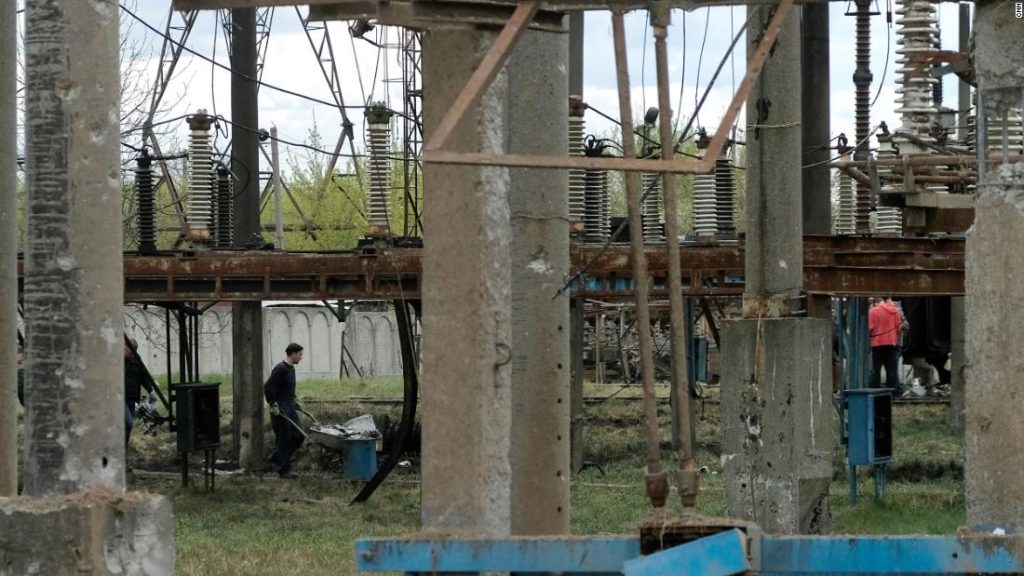
The coordinated strikes caused brief blackouts in parts of the area and delayed more than 40 trains.
“There were also disturbances at our pumping stations, which supply the city with water,” Lviv Deputy Mayor Serhiy Kiral told CNN. He said contingency plans have been implemented to ensure that the water supply is not affected by the strikes.
Tuesday’s attack is the latest in a series of recent attacks on the country’s infrastructure, with the railway network now one of Russia’s main targets.
Russia said on Wednesday that it believed any weapons – including NATO equipment – arriving in and moving inside Ukraine were targets, according to Russia’s RIA Novosti news agency.
Five train stations in western and central Ukraine were hit within an hour on April 25. Two days later, a missile hit a railway and road bridge across the mouth of the Dniester River, which connects the southern port city of Odessa with the country’s far southwestern region. Then on Friday, another important railway bridge was blown up near the town of Sloviansk in the eastern Donetsk region.
Pentagon spokesman John Kirby said Wednesday that Russian forces are “trying to hit what we believe are key infrastructure targets westward” in Ukraine, including “electric power, transportation hubs, and so forth.”
Kirby said that despite the recent attacks, the United States was still able to “flow” military assistance into the region, including “weapons systems” and other materials.
The national railways have always played a decisive economic role in Ukraine, transporting agricultural exports and heavy industry across the vast territory of the country.
But since the Russian invasion began in late February, the train network has become Ukraine’s lifeline to the outside world: it’s how weapons, supplies and humanitarian aid get into the country.
Mayor Kerral played down Russia’s attempts, saying he believed they would not have “any significant impact” on supplies coming from the West.
However, he acknowledged that the attacks could disrupt Ukraine’s trade with the outside world. “It could affect the exports of Ukrainian goods, which is critical at these times of the year because we need to get more than five million tons of grain out so that we are ready for the new harvest.”
For the more than 230,000 Ukrainians working on the rail network, the recent attacks were a reminder of how dangerous — and vital — their jobs are.
Andrey, a railway worker on one of the lines from Poland to Lviv, told CNN: “We are worried. When we hear the siren, we must run to the shelter. Just yesterday, two missiles landed nearby.” Andre declined to give his last name due to safety concerns. The railways are a strategic asset and their employees are not officially authorized to speak to the media.
Andrey, who has been in the railways business for 28 years, said he is very proud to be part of the effort that keeps Ukraine moving.
As he extracted stones and dirt from under the rail, he spoke of his fear. “We just want to work safely, and nobody wants to get hurt from the air,” he said.
Since the railways played an important role in the conflict, the Ukrainians also used them tactfully, striking key parts of their network in the Russian-occupied regions of the country.
Last Thursday, Ukrainian forces blew up a bridge linking Crimea to the Russian-occupied part of southern Ukraine in an attempt to disrupt the flow of weapons.
Serhiy Prachuk, a spokesman for the Odessa military administration, said Russian forces were using the bridge “to supply Crimea with weapons and fuel”.
Maxim, a colleague of Andrey, works on the railways as part of his compulsory military service.
As a religious man, Maxim, who also refused to reveal his last name, said that his faith did not allow him to bear arms. “So I’m doing it as a substitute,” he told CNN, saying that making sure the trains keep running is his way of fighting.
CNN’s Tim Lister, Madalina Araujo Issa Soares contributed reporting from Lviv, Ukraine. CNN’s Michael Conti, Barbara Starr, and Nikki Robertson also contributed reporting.

“Travel specialist. Typical social media scholar. Friend of animals everywhere. Freelance zombie ninja. Twitter buff.”

:quality(85)/cloudfront-us-east-1.images.arcpublishing.com/infobae/2UIT343S7NF3NCRU7YT6O6CXFU.jpg)


More Stories
José Andrés pays tribute to seven World Central Kitchen workers killed in Gaza
Collapse of the power-sharing agreement between the Scottish National Party and the Scottish Greens
Collapse of Moulin Rouge mill blades in Paris – DW – 04/25/2024